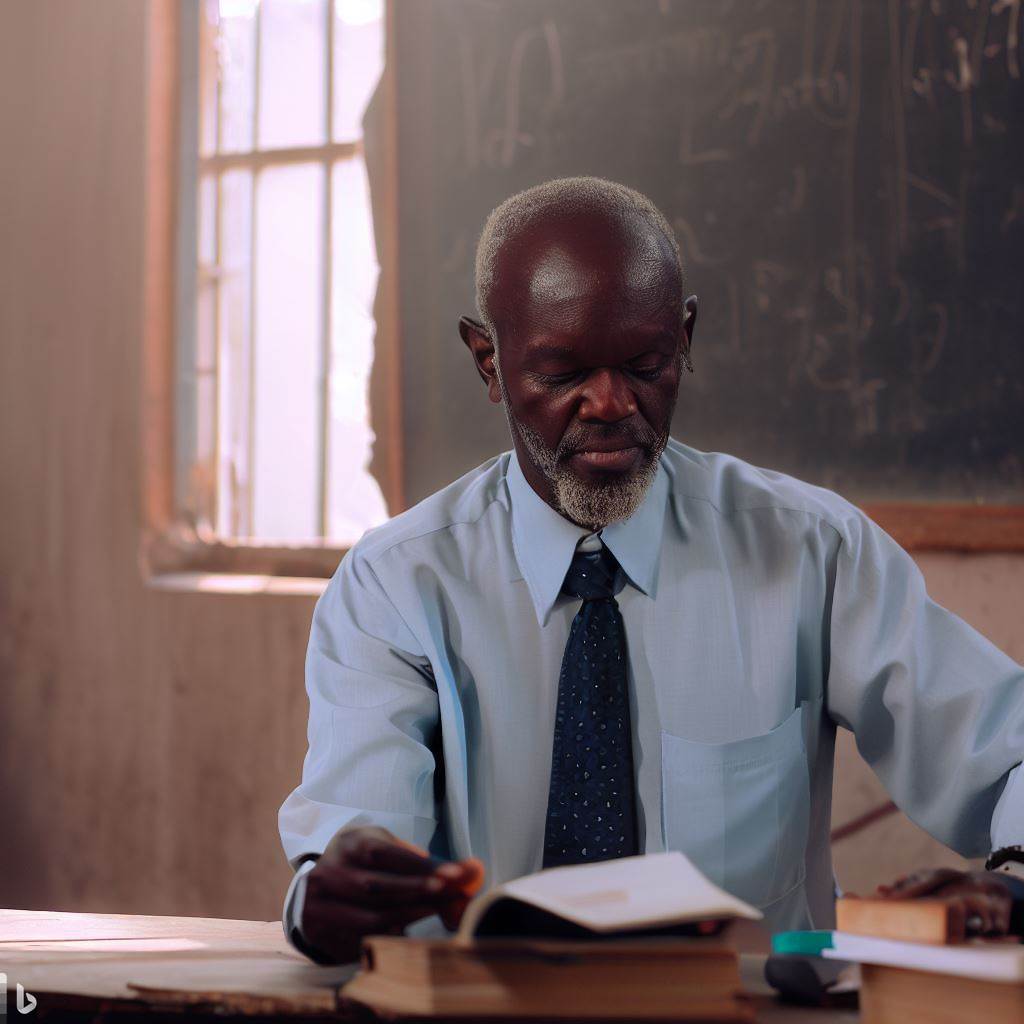Introduction
Nigeria’s educational system is vast and diverse, comprising primary, secondary, and tertiary levels. It faces challenges like overcrowded classrooms, inadequate resources, and outdated curricula.
Delving into the role of teachers is crucial. They are the backbone of education, shaping young minds and influencing the nation’s future. Understanding their challenges and impact is vital for improvement.
In this post, we will dissect the pivotal role teachers play within Nigeria’s educational framework. We’ll analyze their challenges, their influence on students, and the potential solutions for a better system.
By acknowledging and addressing these issues, we pave the way for a brighter educational landscape in Nigeria.
Historical perspective
Historical development of the educational system in Nigeria
- The educational system in Nigeria has a rich history that dates back to pre-colonial times.
- Before colonial rule, education in Nigeria was primarily traditional, imparted within the community and based on cultural practices.
- Formal education began with the advent of Christian missionaries in the 19th century. Missionaries established schools, providing basic literacy and religious education to Nigerians.
- The curriculum during this period focused on religious teachings and basic reading and writing skills.
- In the early 20th century, the colonial government established more schools, with an emphasis on training locals for subordinate positions.
- These schools primarily served the children of elites and were restricted in their access to the majority.
- However, the educational system gradually expanded, and more Nigerians gained access to education.
- The Nigerian education system continued to evolve, with the introduction of a standardized curriculum and examinations.
- At the dawn of independence in 1960, the Nigerian educational system had made significant progress.
Influence of colonial rule and post-independence changes
- Colonial rule had a profound impact on Nigeria’s educational system.
- The curriculum was shaped to serve colonial interests, often ignoring indigenous knowledge and cultural practices.
- The divide between the education provided to Nigerians and the British colonial rulers widened.
- Post-independence, Nigeria made efforts to indigenize the educational system, focusing on national identity and development.
- The Nigerian government aimed to promote a sense of unity and social cohesion through education.
- However, challenges such as inadequate funding, political instability, and corruption hindered the progress of the educational system.
- Educational policies fluctuated, leading to inconsistencies in the curriculum and quality of education.
- In recent years, there have been renewed efforts to improve the educational system with the introduction of reforms.
- These reforms aim to address issues such as access, equity, quality, and relevance.
- Teacher training and professional development have become crucial aspects of reform initiatives.
In the end, the historical development of Nigeria’s educational system has been influenced by colonial rule and post-independence changes.
From its traditional roots to the introduction of formal education by missionaries and colonial government, Nigeria has come a long way.
The impact of colonial rule resulted in a divide between the education provided to Nigerians and the colonial rulers. However, post-independence, Nigeria aimed to indigenize education and promote national identity.
Yet, challenges such as funding, political instability, and corruption have hindered progress.
Efforts are being made to improve the educational system through reforms and focus on teacher training and professional development.
Read: Changing Lives: Stories of Special Education in Nigeria
Current structure of Nigeria’s educational system
Overview of the different levels: primary, secondary, and tertiary education
- Primary education is the foundation of Nigeria’s educational system, usually lasting for six years.
- Secondary education follows primary education and typically lasts for three years.
- Tertiary education represents the final stage of formal education in Nigeria, encompassing universities, polytechnics, and colleges of education.
Challenges and issues faced by the system
- Inadequate funding has been a persistent issue in Nigeria’s educational system, hindering its development and growth.
- Limited infrastructure and lack of modern facilities make it challenging for students to receive a quality education.
- Insufficient trained teachers, particularly in remote areas, contributes to a low teacher-student ratio and ineffective instruction.
- The prevalence of corruption within the educational system has contributed to the decline in its quality and reputation.
- Unfavorable working conditions and low salaries discourage qualified teachers from joining or staying in the profession.
- Curriculum gaps and outdated teaching methods hinder the system’s ability to provide relevant and practical knowledge to students.
- Inadequate access to education, particularly for girls and marginalized communities, perpetuates inequality and limits opportunities.
- The language barrier also poses a significant challenge, as many students struggle with English, the primary medium of instruction.
- Social issues, such as security concerns and cultural biases, affect the availability and accessibility of education in certain regions.
- The rapid population growth in Nigeria puts additional strain on the educational system, unable to accommodate the increasing number of students.
Importance of Teaachers
Despite these challenges, teachers play a crucial role in Nigeria’s educational system and have the power to effect positive change.
They not only impart knowledge but also shape students’ attitudes, values, and aspirations.
Teachers serve as mentors, role models, and advocates for learners, empowering them to reach their full potential.
By fostering a supportive and inclusive learning environment, teachers can create opportunities for students to thrive academically and socially.
Moreover, teachers can contribute to curriculum development, incorporating innovative and interactive teaching methods to enhance students’ learning experiences.
Building strong partnerships and collaboration among teachers, parents, and communities can also strengthen the educational system as a whole.
Recognizing the importance of teachers, the Nigerian government must address the challenges they face and provide adequate support.
Increasing funding, improving teacher training programs, and creating attractive incentives are crucial steps towards developing a robust educational system.
Furthermore, implementing comprehensive educational reforms, such as curriculum updates and modernization, can ensure that Nigerian students receive a relevant and well-rounded education.
With the dedication and commitment of teachers, coupled with systemic improvements, Nigeria’s educational system can overcome its challenges and shape a brighter future for its students.
Read: Parental Perceptions of Special Education in Nigeria
The responsibilities of teachers
Classroom instruction and curriculum delivery
- Teachers are responsible for delivering quality instruction to students in various subjects.
- They must ensure that the curriculum is effectively implemented and aligned with educational standards.
- Teachers should use various teaching strategies and methods to engage students and promote active learning.
- They need to adapt their teaching to meet the diverse needs of students, including those with special needs.
- Teachers should use technology and other resources to enhance instruction and make it more interactive.
Fostering a positive learning environment
- Teachers play a crucial role in creating a positive and inclusive classroom environment.
- They should establish clear rules and expectations for behavior and promote a sense of respect and mutual understanding.
- Teachers should encourage collaboration and teamwork among students and create opportunities for them to express their opinions.
- They should also create a safe and supportive environment where students feel comfortable to take risks and ask questions.
- Teachers should be role models and consistently model respectful and ethical behavior.
Assessing student progress and providing feedback
- Teachers are responsible for assessing students’ learning and providing feedback on their progress.
- They should use a variety of assessment methods, including tests, projects, and presentations, to evaluate students’ knowledge and skills.
- Teachers should provide timely and constructive feedback to help students improve their performance.
- They should also monitor students’ progress and provide additional support or interventions as needed.
- Teachers should involve students in the assessment process and help them set realistic goals for their learning.
In conclusion, teachers in Nigeria’s educational system have a range of responsibilities.
They are not only responsible for delivering quality instruction and implementing the curriculum but also for creating a positive learning environment and assessing students’ progress.
Teachers play a crucial role in shaping the future of the country by nurturing and educating the next generation.
Read: The Demand and Supply Gap of Special Ed Teachers in Nigeria

Key challenges faced by teachers
Inadequate training and professional development opportunities
Teachers in Nigeria often face the challenge of insufficient training and limited access to professional development opportunities.
This hampers their ability to keep up with the evolving educational landscape and effectively cater to the needs of their students.
Low salaries and lack of motivation
One of the major challenges that teachers in Nigeria face is the issue of low salaries.
Many teachers struggle to make ends meet, which not only affects their motivation but also hinders their ability to effectively carry out their duties.
This can lead to a lack of enthusiasm and dedication towards their profession.
Overcrowded classrooms and limited resources
Overcrowded classrooms and insufficient resources pose significant challenges for teachers in Nigeria.
With a large number of students to cater to, teachers find it difficult to give individual attention to each student, resulting in compromised quality of education.
Limited resources further exacerbate this issue, making it hard for teachers to provide adequate learning materials and tools.
Teachers often face the daunting task of managing a class of 50 or more students, making it incredibly challenging to ensure effective learning and discipline.
Additionally, the lack of teaching aids and materials such as textbooks and stationery limits their ability to deliver comprehensive lessons.
With limited resources, teachers are often forced to rely on outdated teaching methods, which may not align with modern educational practices.
This creates a disconnect between the skills students need to acquire and the methods used to impart those skills.
Moreover, the lack of proper infrastructure and amenities in schools further compounds the challenges faced by teachers.
Many schools lack basic facilities like electricity, clean water, and functional classrooms, making it extremely difficult for teachers to create a conducive learning environment.
Furthermore, the issue of inadequate support from the government is also a significant challenge faced by teachers in Nigeria.
Teachers often have to contend with delayed salary payments and a lack of benefits and incentives. This lack of support and appreciation can lead to demotivation and a decline in the quality of education.
In fact, teachers in Nigeria face various challenges that hinder their ability to provide quality education.
Inadequate training, low salaries, overcrowded classrooms, and limited resources all contribute to the overall struggling educational system.
It is crucial for the government and relevant stakeholders to address these challenges and provide teachers with the necessary support and resources to ensure a better educational experience for Nigerian students.
Read: Improving Special Education with Nigerian Government Policies
The impact of teachers on students and society
Influencing students’ personal and academic development
- Teachers play a crucial role in shaping students’ character and values.
- They inspire and motivate students to believe in themselves and strive for success.
- Teachers provide guidance, support, and mentorship to help students reach their full potential.
- They foster a love for learning, critical thinking, and problem-solving skills in students.
- Teachers create a safe and nurturing environment for students to develop emotionally and socially.
Shaping the future of Nigeria through education
- Teachers are responsible for imparting knowledge and skills that contribute to building a knowledgeable society.
- They educate and prepare students to become responsible citizens who can contribute positively to society.
- Teachers instill values such as tolerance, respect, and empathy in students, promoting a harmonious society.
- They equip students with the necessary tools to contribute to economic growth and development.
- Teachers empower students to become leaders and change-makers, shaping the future of Nigeria.
Contributing to the overall development and progress of the nation
- Teachers have a significant impact on the quality of education and educational outcomes in Nigeria.
- They play a vital role in improving the literacy rate and reducing the education gap in the country.
- Teachers facilitate the acquisition of knowledge and skills needed to address societal challenges.
- They promote innovation, creativity, and critical thinking among students, leading to societal progress.
- Teachers collaborate with policymakers and stakeholders to bring about positive changes in the education system.
In essence, teachers in Nigeria’s educational system have a profound impact on students’ personal and academic development.
They shape the future of Nigeria by providing education and instilling values in students.
Moreover, teachers contribute to the overall development and progress of the nation by improving the quality of education and promoting innovation.
Recognizing and supporting the role of teachers is crucial for Nigeria to achieve its educational goals and build a prosperous society.
Read: Insights into the Teaching Profession in Nigeria Today
Strategies for improving the role of teachers
Enhancing teacher training programs
- Implementing comprehensive and up-to-date teacher training programs to equip educators with necessary skills.
- Incorporating innovative teaching methods and technologies in teacher training curricula.
- Offering continuous professional development opportunities to ensure teachers stay updated with current educational trends.
- Collaborating with international institutions to provide exposure to global best practices in teaching.
Providing competitive salaries and benefits
- Reviewing and increasing teacher salaries to attract and retain talented individuals in the teaching profession.
- Offering performance-based incentives to motivate teachers and recognize their efforts.
- Providing health insurance, retirement plans, and other benefits to ensure job security and financial stability for teachers.
- Conducting regular salary reviews to adjust for inflation and maintain competitiveness.
Reducing classroom sizes and increasing resources
- Allocating sufficient funds to build more classrooms to accommodate smaller class sizes.
- Hiring additional qualified teachers to reduce student-teacher ratios and enhance individual attention.
- Equipping classrooms with modern technology, teaching aids, and learning materials to enhance the teaching-learning experience.
- Regularly evaluating and upgrading infrastructure to create a conducive learning environment.
Encouraging professional development opportunities
- Providing opportunities for teachers to attend workshops, conferences, and seminars to enhance their knowledge and skills.
- Establishing partnerships with educational institutions and industry experts to facilitate mentorship programs.
- Encouraging teachers to pursue higher education and advanced degrees to deepen their subject knowledge.
- Creating platforms for peer collaboration and sharing best practices among teachers to foster a culture of continuous learning.
Implementing these strategies will contribute significantly to improving the role of teachers in Nigeria’s educational system.
Enhancing teacher training programs ensures educators are well-equipped to handle the evolving needs of students and deliver quality education.
Providing competitive salaries and benefits not only attracts talented individuals to the profession but also helps in retaining experienced teachers.
Reducing classroom sizes and increasing resources create a conducive learning environment, fostering better student-teacher interaction and overall academic growth.
Encouraging professional development opportunities empowers teachers to continually upgrade their skills and stay at the forefront of educational innovation.
By prioritizing these strategies, Nigeria can pave the way for a transformative educational system that nurtures students and empowers teachers alike.
Read: A Comprehensive Overview of Special Education in Nigeria
Conclusion
Teachers play a crucial role in Nigeria’s educational system. They serve as facilitators of knowledge, mentors, and role models for students.
A recap of the importance of teachers in Nigeria’s educational system reveals their significant impact on shaping the future generations.
They not only impart knowledge but also instill values, critical thinking skills, and a lifelong love for learning.
However, the well-being and development of teachers must be prioritized to ensure the effectiveness of their roles.
It is crucial for the government and educational stakeholders to address the challenges faced by teachers and provide necessary support.
A call to action is needed to allocate adequate resources and investments in teacher training, professional development, and welfare.
This will attract and retain qualified teachers, enhance their skills, and foster a positive teaching environment.
By valuing teachers and ensuring their well-being, Nigeria’s educational system can achieve its goals of providing quality education and nurturing well-rounded individuals who will contribute to the nation’s development.
Together, let us prioritize the teachers’ role and empower them to create a better future for Nigeria through education.




